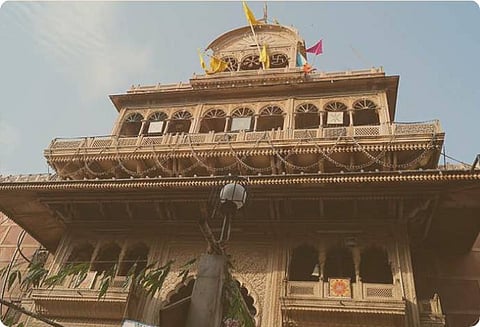

LUCKNOW: Priests at the famous Banke Bihari temple in Vrindavan rejected a demand to stop using attires made by Muslim artisans for its deity, stating that religious discrimination had no place in the temple's traditions.
The demand was made by Dinesh Sharma, who leads Shri Krishna Janmabhoomi Mukti Sangharsh Nyas, urging the temple management to avoid buying attires curated by artisans of the other community to ensure that Lord Krishna's attire were crafted only by those who adhere to "religious purity."
However, the temple priests said the demand was “impractical” as other communities “simply did not have the same level of dexterity in crafting these attires.”
As per Sharma, around 80 per cent of the artisans engaged in making the attires, crowns, and intricate ‘zardozi’ work for the deities are Muslims.
“Not just attire, but even the temple's iron railings, grills, and other structures are also moulded by them. How can we inspect the personal purity of every artisan,” he asked.
Rejecting the demand, temple priest Gyanendra Kishore Goswami said that artisans could not be judged based on their religion. He said that history was full of such examples where virtuous and sinful individuals born into the same family.
The priest added that removing artisans of any particular community would not only pose the “logistical” challenge but social as well. “About a dozen ornamented outfits daily are required to decorate the deity. Thus around thousands of attire are needed for ‘Bhagwan’ over a year,” he added.
Calling the demand impractical, priest Goswami cited the examples of King Kansa saying that if Kansa, a sinner, could take birth in the same lineage as Lord Krishna's grandfather Ugrasen, and if Prahlad, a great devotee of Lord Vishnu, could take birth in the clan of demon king Hiranyakashipu, how could the artisans be judged based on their faith.
“Moreover, we do not discriminate against any community. Devotees who offer attire for the deity ensure purity themselves before getting them made,” he added.
Significantly, Muslim artisans have historically been associated with the temple contributing to its various traditions.
“In Vrindavan, most of the intricate crowns and dresses for the deity are made by Muslim artisans. Similarly, in Kashi, Rudraksha garlands, sacred to Lord Shiva, are crafted by Muslim families,” argued the priest.
He added that even today, musicians from the Muslim community play the ‘nafiri’ (a traditional wind instrument) during special occasions. Many prominent Bhajan singers hail from the Muslim community offering their Sewa to Lord Krishna,” he asserted.
Meanwhile, temple administrator Umesh Saraswat distanced himself from the row saying it was the temple's priestly lineage which took decisions about deity’s attire and rituals. “We are limited to managing the temple premises and logistics,” he added.